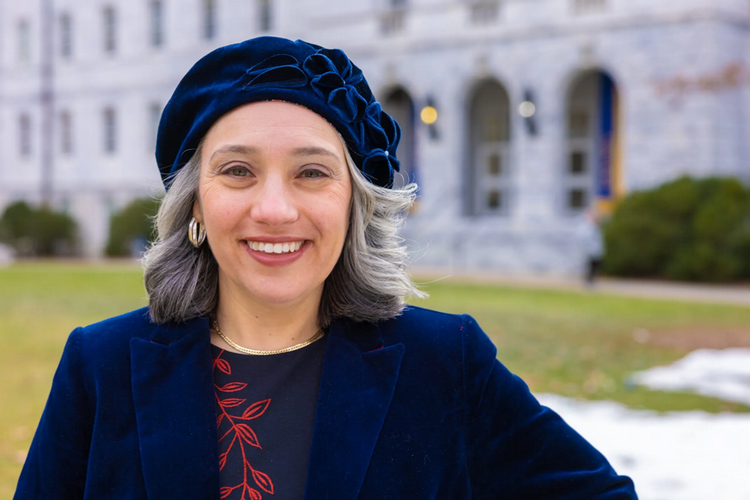A Letter From Director Miriam Udel

Yesterday, the Tam Institute welcomed back our campus community with a casual dinner in the Oxford Road Building living room. With 65 students and faculty members in attendance, it was possible to circulate through the homey space and catch snatches of conversation in English and Hebrew. Returning students caught up with one another, new students ventured introductions, and faculty seized the chance to chat with our current and future students outside of class.
The gathering capped a busy week on the TIJS calendar. Just a couple days before, we hosted a two-day symposium on Jews and Race to kick off the inaugural meeting of the Jewish Studies Working Group. The launch of the JSWG represents the culmination of two years of planning; we are grateful to the Offices of the Provost and the Dean of Emory College for supporting a new vehicle for building intellectual community on and beyond Emory’s campus, engaging our students and the public, and probing some of the most urgent social issues our scholarship can address.
Convened this year by Prof. Eric Goldstein (History, TIJS), the JSWG’s cohort of five external fellows and five Emory faculty members will continue meeting virtually throughout the semester to discuss various dimensions of how Jews have been racialized in different times and places, what cultural work is performed by concepts of race, and how a Jewish Studies lens can enrich the broader theoretical study of race. While the bulk of the Working Group’s activity focuses on discussing pre-circulated papers and works-in-progress, the symposium was anchored by a public roundtable on “Viewing Jews Through the Lens of Race and the Difference It Makes.” This lively discussion showcased for students, colleagues from other units and members of the public the fellows’ wide range of disciplinary expertise and methodological approaches.
On November 6, Princeton University’s Professor Laura Arnold Leibman will deliver this year’s Rothschild Lecture on the topic of "Rethinking Jews and Race: A Multiracial Jewish Family in Early America." This endowed annual public lecture, doubling this year as the Working Group’s keynote event, memorializes The Temple’s late Rabbi Jacob Rothschild and his dedication to advancing the cause of Civil Rights. Prof. Leibman will unpack and interpret the intriguing life stories of siblings Sarah Rodrigues Brandon and Isaac Lopez Brandon, who began their lives poor, Christian, and enslaved in Barbados, and thirty years later, were counted among the wealthiest Jews in New York.
The Jews and Race symposium coincided fortuitously with a visit from Emily Bowen Cohen, author of Two Tribes, a middle grade graphic novel that drew on Cohen’s own life experience to depict how a mixed-race Muskogee and Ashkenazi Jewish girl came to understand and fully embrace her own sense of belonging in both tribes. TIJS was proud to co-sponsor Cohen’s visit, which culminated in a vibrant and well-attended public lecture, together with the Emory Center for Native American and Indigenous Studies.
We are honored to welcome back to Emory Prof. Deborah Lipstadt, after the conclusion of her service as Special Envoy to Monitor and Combat Antisemitism. We are also pleased to welcome back Professor Craig Perry back from a semester of research in Italy as a recipient of the Rome Prize, and we send congratulations across the Atlantic as Professor Geoffrey Levin takes up the Koch Junior Fellowship in History at the University of Oxford. During his absence and through the generosity of the Israel Institute, we have been able to welcome Dr. Robert DeBoard to Emory this year to teach courses on Israel Studies.
With the comings and goings of our accomplished colleagues, I gratefully acknowledge the blessings of continuity in Tam’s faculty leadership. Prof. Bill Gilders will continue to serve as Director of Graduate Studies, while Prof. Ellie Schainker will continue as Director of Undergraduate Studies. She will once again teach a spring course on the history of Jews in Poland and lead the capstone two-week Maymester trip to Poland. Participants will draw on their deep learning in the course as they visit key sites in the millennium-old civilization created by Jews in Poland, reckon with the destruction visited by the Holocaust, and think critically about efforts toward memorialization and related activism in contemporary Poland. Thanks to the partnership of our generous donors, this travel experience will be subsidized to meet the financial need of interested participants.
I will close by expressing my gratitude to Prof. Hazel Gold, who served as interim director last year while I conducted research at the Center for Jewish History as the College’s Chronos Fellow and as the Rifkind Senior Fellow at the CJH. During a challenging year, she led TIJS with grit and grace. Prof. Gold and I, along with all the Institute’s stakeholders, have both continued to benefit from the dedication of our curricular coordinator, Malory Mibab and our communications and events coordinator, Brent Buckley, for which we are grateful.
In what feels like dark and uncertain times, the work that we do aspires to shed light and imagine new possibilities. I feel a profound sense of appreciation to all who support and share in that work.
Miriam Udel
Judith London Evans Director
Published 9/18/25